Richard Hell on walking out on the music industry 30 years ago
Super tramp
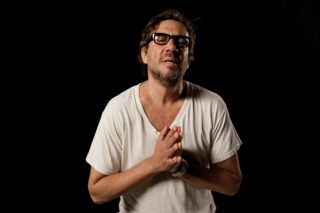
Super tramp
After roles in seminal groups like Television, The Heartbreakers and Richard Hell and the Voidoids, Richard Hell quit music in 1984 and in doing so also ditched a drug habit he’d been carrying around for years. He returned to his literary roots and was never to return to music again, apart from a brief outing in the 1990s with a Sonic Youth off-shoot project called Dim Stars and a brief post-Talking Heads outfit collaboration, The Heads. After several novels and other literary ventures, Hell has just released the riveting I Dreamed I Was a Very Clean Tramp, an autobiography that captures a profoundly auspicious, dangerous and fabled period in New York City’s musical culture.
Hell’s tale is imbued with the stereotypical cocktail of sex, drugs and rock’n’roll but thankfully his approach and re-telling is atypical. This isn’t a score-settling, vilifying, embittered rant against those who crossed him, not a vehement, bile-spewing attack on an industry he left (although each are definitely touched upon), but more an honest, seemingly accurate – albeit subjective – reflection and depiction of his life and the immensely rich musical period he was a part of. Hell’s prose flows and glides. Two decades spent as a novelist and writing being his main love before he even got involved with music means that while we are dragged through the grubby, crime-ridden streets of being young, broke and angry in 1970s NYC, Hell takes us there in an executed, eloquent manner.
As he speaks from his New York apartment – one he has remained in for decades – Hell is a slightly croaky, very slow speaking man. His voice emits a lifetime’s worth of 5am wine drinking and endless chain-smoking. He puts his responses together in very slow, occasionally painfully, separated junctures. Of the hour we speak, possibly twenty minutes are a prolonged, grizzly drone that is Richard Hell either stumbling for words, or thinking via an elongated ‘mmmmmmm’. For someone who has just spent five years writing his life story, it is somewhat understandable that taking his time to find the words to use to talk about it, is of great importance.
“I didn’t take a stance about it,” he tells me, looking back on his finished work. “I didn’t worry about it. I think my approach to writing, it was: I didn’t hold back. I was talking the way I would to a friend who I really trusted, I didn’t worry about the way I would look, or at least as little as possible.”
The book has been a success, but in regards to the response, Hell tells me he’s “OD’d on it.”
“It’s kind of redundant,” he says. “It’s had way more coverage than anything else I’ve ever written. It’s now hard to find anything new written about it. The main thing that strikes me is the range of reactions – you’ll read one writer write about one sentence and call it brilliant and another will write about the same sentence and call it pathetic.” I offer my favourite line from the book in the hope we can discuss its symbolism. “Does it refer to, erm, sexual parts?” Hell gingerly enquires, (there is a lot of sex in the book. Hell’s quench for coital-relations often matches his quench for drugs). No, I tell him. “Then go ahead,” he responds.
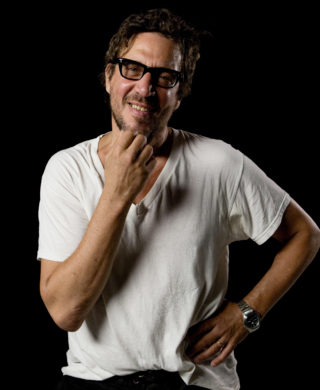
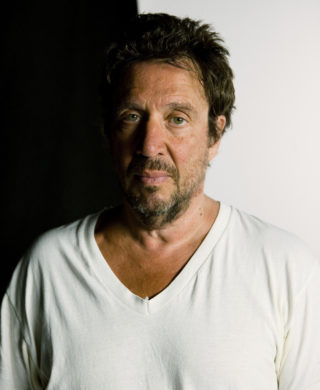
The line itself is a reference to Hell’s love for MAD magazine as a youth but operates on a further, ultimately deeper level in the context of his artistic career.
A husky laugh trickles down the phone-line from New York. “Nobody has remarked on that line yet,” he says. “I’m glad you grabbed that one because my editor wanted me to take that one out.
“I agree with you, actually; you remind me of when I speak about Lester Bangs in the book and he characterises my work in a way that he means to be kind of critical but I agree with.” The Bangs-written line in question, Hell refers to as his “aesthetic ideal”. Bangs once wrote after an interview: “Look, I started out saying how much I respected this guy’s mind and perceptions. I still do in a curious way – It’s just that he paints half the picture of reality with consummate brilliance and the other half is Crayola slashes across a field of Silly Putty and Green Slime.”
Hell continues to explain his fondness for the aesthetically jagged. “I like architecture, like the Pompidou Centre in Paris where you see all the tubing and vents and apparatus instead of it just being this smooth design like there was some kind of purity to it but instead it’s full of these bulging intestines and wires.”
Seeing as though Hell has brought up Lester Bangs, it seems like a good place to challenge his belief that music journalism hasn’t come from the heart since 1976. “I don’t really read much music criticism these days,” he confesses. “There was a time in the 1970s when my whole world was what bands were doing and what records were being made and what influence they were having. Lester was always extraordinary that way. There was a period between the mid ’60s and early ’70s when music was thought of as being a life and death thing where people stake their whole conception of themselves and their entire relationship to music was the world, and Lester was always the epitome of that and that period is definitely over.
“You look at periods like the ’80s and everybody became so self conscious and things like irony came in. The whole conception of rock’n’roll as being any kind of transcendental experience – it was almost religious for a while – that’s just gone. It’s like entertainment now. There’s an innocence gone and a level of commitment that has just gone.”
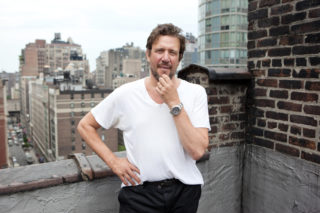
There is a sub-text apparent in the book. Perhaps initially an inadvertent one but by the end it becomes an underlying but inescapable theme. It is, in many senses, a love story, between author and once best friend and Television band-mate Tom Verlaine. The opening half: their flourishing romance, their honeymoon period and then: the collapse, the break-up, the going wild on drink, drugs and sex in the wake of the fall-out. Although it isn’t until the epilogue (when Hell stumbles across Verlaine in the street) that the word ‘love’ is used to describe this relationship. When I mention the word ‘love’ a hearty, growly chuckle comes down the line and Hell offers a different spin on this element. “Yeah, but there are a couple of caveats or angles on that that I might mention. Number one, that epilogue was written after I had finished the book, the book was finished in 2011, and I started it in 2006. I knew the book ended abruptly, even though I spoke about it and I felt the explanation was sufficient, but viscerally it felt sudden, so I felt the need for something more, some way to trail off a little more gracefully, but I didn’t know what to do. There was a month or two where I was just percolating – I needed to soften the cut-off. Then I had that experience when I ran into Tom in the street but I feel like I have a small fear that I jumped on that as a writer. I wonder if I hadn’t have been writing a book, if I’d have just kept on walking. So I wonder if it’s a tiny bit manufactured. But as is the nature of non-fiction, you are deciding what to bring to people’s attention. How much did I create that moment because I needed it for the book? That’s one angle; the other is that there is this kind of reversal. For so long I’ve been dismissive and angry, but I’ve also been entirely removed, it wasn’t anything I dwelled on. The problems I’d had with Verlaine back in the ’70s were not things that had ever concerned me, I went on and had a life. The way we went off, going in different directions, was inevitable. I had no bad feelings about it; we were just like oil and water. It was a little bit shocking at the time after we’d been such good friends for a long time but it was inevitable and natural, even the part about the band, in the way he forced me out of the band. Very quickly within the next year I played his role. After a year in the Heartbreakers I realised I needed a band in which I could get out what I wanted and that I needed a band that I could lead unequivocally. Anyway what I’m getting at is that it’s true our friendship in our late teens and early twenties meant a lot and that gets captured in the book, but those years are also kind of the most rich and fruitful for many, many people; they are the years that you are forming who you really are so they have extra significance. It wasn’t like it was anything that preoccupied me; it was just something from my past. I never even thought about it but it was kind of a sore point, you know, I didn’t even wanna hear his record. It’s like an old love affair, you’re totally over it but you don’t want it brought back up in your head.”
At this stage it’s difficult to work out if Richard is attempting to be particularly explicit in respect to his relationship with Tom as a means to off-set decades worth of gossip and untruths about the pair of them and the perceived viewpoint of Hell towards Verlaine, or if Hell is somehow justifying or dismissing the significance of Verlaine in his life as a means to continue to block-out an underlying, irrefragable pain that still resides since their friendship fell apart. Hell concludes, however: “Anything in this book could have been written a different way. It was always there, the affection and the respect was there in the same way the resentment and the hatred was.”
The book cuts off in 1984 when Hell quit music and drugs, but in the preceding decade Hell had lived more wildly and voraciously than many would in a lifetime. Yet unearthing these tales and having to resurrect the lives and stories of many dead friends and acquaintances hasn’t made him look back dismissively. “I don’t believe in regrets,” he says. “It doesn’t have any meaning to have regrets unless it’s a matter of regretting something you did to someone and you’re trying to make up for it. Personally I just describe my experience, I don’t judge it. I don’t have regrets or pride, It’s just what happened.”
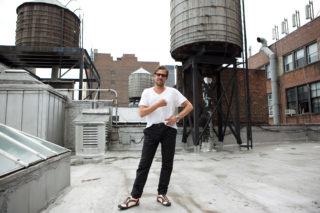
In the book Hell also avoids the usual moral high ground many ex-drug users take in their later life. Did, I enquire, drugs make his life more interesting, for a time? “Well yeah,” he says, “just like a new food does or a new girlfriend, it’s new and has some kind of sensory appeal. It was interesting, sure. That doesn’t mean it’s not dangerous or poisonous, but yeah, it was interesting.”
At this stage the phone goes dead and after a few minutes we reconnect. Sensing Hell’s reluctance to discuss drug-use, I nervously ham-fist a somewhat convoluted question about drugs and their cultural significance during this period. “What is it?” he asks, unable to unravel my question.
“Drugs!” I reply.
“You’re still asking me about drugs?!” he fires in a tone riddled with impatience. “I’m not happy…” he stops, no doubt just before he was about to finish with ‘talking about this’, but he continues. “Okay, you’re going to have to repeat the question.” I do, rephrasing it slightly less clumsily, to which he says: “I covered that in the book, I was very clear about that.”
Despite Hell’s complete frankness in the book, throughout our conversation he seems intently reticent to discuss many subjects dissected in its pages, but perhaps that was the point of writing such a book, to evade people like me probing into his life. He concedes and kindly continues. “Now I’m talking about narcotics here, opiates, that’s it, because every drug is different but the one that brought me down was narcotics, that was my problem. At the beginning it’s just bliss because that’s what it is, it’s a painkiller; you never imagine you’re going to get a habit, you never feel like it will be a challenge to avoid taking it everyday. It takes a good couple of weeks before you can get any kind of habit so you just don’t worry about it; it gives you this euphoric blissful feeling and depending on your own personality type and your own proclivities it can be something that is especially appealing to you. Like dreaming, it makes you dream in this literal way, you’re asleep but you’re not actually asleep, you’re nodding. It takes away pain, it takes away anxiety, it makes your whole body feel good inside. In a lot of ways its similar to sex, it gives you that feeling after you’ve just had sex, it gives you that sleepy, blissful drifting state so there is a lot that’s appealing about it. You don’t know about the dangers until you’ve succumbed, until you’ve gone far enough that you’ve got a habit and then it just becomes a fucking bore and not only does it eat up your whole life but it prevents you from doing your best at anything. That’s the main way that it affects you as a human being, you are unable to apply yourself, you just don’t demand as much of yourself for anything if you have a drug habit.”
I begin to move on but Hell interjects and continues, a wind picking up in his sails.
“… And it’s torture because you fucking realise all those things and your whole life has been turned into a search for drugs and the effort to get free from them is so painful, it’s like the pain and suffering is at least equal, probably greater, than any of the pleasure you had at the beginning. I’m talking specifically about physical pain… and the psychological pain is even harder… Does that answer your question?” Hell says, with an exerted laugh.
We then wrap things up and Hell growls goodbye as he returns to his book-filled New York apartment and a life happily away from a music business that he helped change.